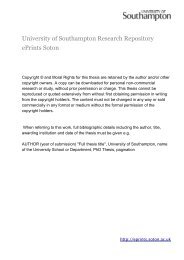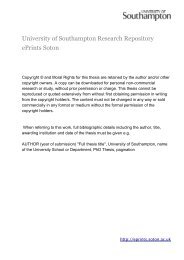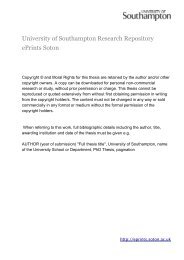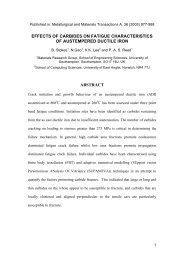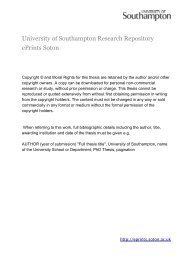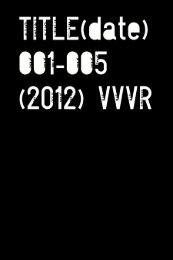obscenites renaissantes - ePrints Soton - University of Southampton
obscenites renaissantes - ePrints Soton - University of Southampton
obscenites renaissantes - ePrints Soton - University of Southampton
Create successful ePaper yourself
Turn your PDF publications into a flip-book with our unique Google optimized e-Paper software.
SINGING THE COURTLY BODY 197<br />
suggests that further investigation might legitimately look within court practice<br />
for other performance milieux. The letter <strong>of</strong> dedication to Ottaviano Petrucci's<br />
Odhecaton A (1501), the first collection <strong>of</strong> polyphony to be printed by moveable<br />
type, outlined the main occasions for the use <strong>of</strong> its contents, specifically mentioning<br />
weddings and banquets.' However, studies <strong>of</strong> court spectacle have usually focused on<br />
formal festivities, in which the musical components are generally large-scale settings<br />
<strong>of</strong> elaborate ceremonial and occasional texts, <strong>of</strong>ten in Latin. In Dejean's reading, more<br />
equivocal material was principally a feature <strong>of</strong> popular entertainments that have left<br />
few documentary traces before the seventeenth century.'" Her association <strong>of</strong> crude or<br />
sexually explicit content with popular events echoes the approach <strong>of</strong> some <strong>of</strong> the early<br />
scholarship on the chanson literature. But in the Institution <strong>of</strong> Christian Matrimony,<br />
Erasmus attributes the custom <strong>of</strong> boisterous weddings, where obscene songs, stories and<br />
jokes are given free rein, to a desire for social climbing: in his view, such events do not<br />
reflect popular practice but result from imitation <strong>of</strong> elite magnificence. Elsewhere in<br />
the treatise his location <strong>of</strong> obscene behavior is cast in even more specifically anti-aulic<br />
terms." Although it seems likely that Dejean was unaware <strong>of</strong> the large body <strong>of</strong> printed<br />
chansons setting equivocal lyrics, their existence also argues against ephemerality and<br />
gestures towards the emerging concept <strong>of</strong> the musical work, whose basic elements are<br />
stably preserved through print.<br />
Dejean's arguments on the emergence <strong>of</strong> a modern concept <strong>of</strong> the obscene rely<br />
not only on the appearance <strong>of</strong> sexually transgressive material in print, but on how<br />
print made such material available to groups whose perceived need for protection<br />
led to secular censorship.'^ In this reading, transgressive content was tolerated if<br />
'Facciamo pur noi carnevale-. Non-Florentine Carnival Songs <strong>of</strong> the Late Fifteenth and Early<br />
Sixteenth Century,' in Musica Franca: Essays in Honor <strong>of</strong> Frank A. D'Accone, ed. by Irene<br />
Aim, Alyson McLamore and Colleen Reardon (Stuyvesant, NY: Pendragon, 1996), pp.<br />
173-211.<br />
A translation <strong>of</strong> the letterfigures in Bonnie J. Blackburn, 'Lorenzo de' Medici, A Lost Isaac<br />
Manuscript, and the Venetian Ambassador,' in Musica Franca, pp. 19-44 (pp. 33-34)-<br />
'There was probably a good deal <strong>of</strong> sexually transgressive content in such popular genres as<br />
mime and Fescennine [«V] (a type <strong>of</strong> verse featured at weddings and harvest festivals), genres<br />
that would not have respected the rule <strong>of</strong> formal elegance. [...] Such forms <strong>of</strong> ephemeral<br />
sexually transgressive material are so hard to document, at any period but the present day,<br />
that I limit my discussion to works whose circulation was more traditional' Dejean, The<br />
Reinvention <strong>of</strong> Obscenity, p. 133, n. 9.<br />
'The wedding will be considered beggarly unless a horde <strong>of</strong> aristocrats, grandes dames,<br />
plutocrats, and other notables is invited to the feast. A so-called respectable wedding is<br />
one where vast sums <strong>of</strong> money are squandered on frippery [.. . ] and where licence is freely<br />
granted to filthy language and silly pranks.' {Institution, pp. 348-9). Further on (p. 350),<br />
Erasmus complains that the marriage sacrament is sullied by 'silly games, laughter, lutes,<br />
pipes, foolery, and dancing.' On how scandalously girls are brought up at court 'in certain<br />
countries', see p. 414.<br />
Dejean, The Reinvention <strong>of</strong> Obscenity, p. 7.










